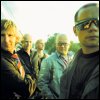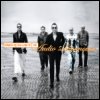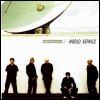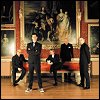DELIRIOUS:
Take a look at the titles of the Delirious? albums over the years and the story tells itself. There were days of being Cutting Edge youth workers, assaulting the UK mainstream charts singing about the King of Fools followed by the delivering deeper messages of transformation and Mezzamorphis. Glo took the focus back to the source, while World Service indicated the new global view that was coming into focus. And now this, The Mission Bell. Ringing loud, ringing clear, this latest offering makes one thing abundantly clear: the time is right for change. No compromise, no holding back, now is the time to shine.
Delirious? have always talked about being on a journey, always embracing change and looking out for direction. It all goes right back to the start. In 1992 producer/engineer Martin Smith (vocals and guitars) teamed up with studio owner Tim Jupp (keyboards) and graphic designer Stew Smith (drums) to provide the music for a local event aimed at joining the dots between church and young people. The blend of Smith’s open hearted lyrics with the rest of the band’s home grown delivery made immediate sense to those who saw it first hand. Things were rough yet soaked in the sweat of honest enthusiasm, and the band quickly made a name for themselves as the most exciting band on the UK Christian scene.
 But if you’re thinking that this was all part of some cynical plot to manipulate good will and deliver fame via the back door, you’d be wrong. Like they simply got there by merit. Early tapes sold in abundance, and each project brought in revenue that was ploughed immediately into bigger and better successors.
But if you’re thinking that this was all part of some cynical plot to manipulate good will and deliver fame via the back door, you’d be wrong. Like they simply got there by merit. Early tapes sold in abundance, and each project brought in revenue that was ploughed immediately into bigger and better successors.
Within four years the band were full time – joined by Stu G on guitars and Jon Thatcher on bass – and within five they were releasing singles and albums into the UK charts. Their early Cutting Edge recordings had shaped the way people thought of worship music; the tracks released from 1997’s King Of Fools edited the way in which the mainstream music industry thought about Christian bands. For some they were controversial, but for all, their success was undeniable: two top twenty singles and a number 13 placing for the album on the UK charts. The roughed-up guitars and euphoric melodies showed the way forward, with Radio 1 dubbing them ‘pop’s best kept secret.’
At the same time the North American market was getting ready to embrace the band. Sparrow signed them and kicked off with the release of their Cutting Edge back catalogue, which eventually went gold. With that under their belts the market then got to sample King Of Fools, which took up lodgings in the Billboard ‘Heatseekers’ Chart for 18 weeks, selling 200,000 copies. The single ‘Deeper’ performed a similar role in America to the one it had tucked into back home: sitting at the very top of the Christian CHR Charts for six weeks. The band, it appeared, had well and truly landed.
Perhaps now might have been a similarly good point for the band to use the ‘World Service’ tag. Aiming now for a global audience the band lined up some key players: the backing of Virgin Records USA for mainstream releases, the headline tours in the United States, Canada, Europe, Australia and New Zealand, as well as distribution deals under the wings of EMI. But of all the forces at work none was so vital as their second studio album Mezzamorphis. A big hitter by any standards, the self-produced project captured the most comprehensive Delirious? soundtrack ever. With the sound of titans clashing in ‘Heaven’ and ‘Bliss’ and the wisdom of ages in the decorating the lyrics of ‘Mezzanine Floor’ and ‘Metamorphis,’ the album delighted press and fans alike. Q magazine called it ‘dense, ingenious… expansive guitar pop’ while Billboard praised the ‘aggressive edge… but passionate, insightful lyrics.’ It hit number 1 on the American Contemporary Christian Music Album Chart and number 25 on the UK charts, reaching number 2 on the indies. With further UK chart success with the single ‘See The Star,’ Delirious? were confirmed as a world class act. Controversial, uncompromising and committed, but world class nevertheless.
 1999 onwards saw the band focus on live performances: playing to over 1 million people in a single 12 month period, including fans on UK legs of both Bon Jovi (2001) and Bryan Adams (2002) tours. In between they finished work on their follow-up album, Glo, a curious project indeed. What started out as a retro-novelty act came out as a full-length masterpiece and wound up getting tabbed by Amazon.com as the number one Christian/Gospel Album of the year as well as being nominated for a Dove Award for Praise and Worship Album of the Year.
1999 onwards saw the band focus on live performances: playing to over 1 million people in a single 12 month period, including fans on UK legs of both Bon Jovi (2001) and Bryan Adams (2002) tours. In between they finished work on their follow-up album, Glo, a curious project indeed. What started out as a retro-novelty act came out as a full-length masterpiece and wound up getting tabbed by Amazon.com as the number one Christian/Gospel Album of the year as well as being nominated for a Dove Award for Praise and Worship Album of the Year.
Installed as an A list live act, crowds regularly topped 30 and 40,000, pushing to 80,000 at US festivals. Alongside the touring, however, came a fresh passion for supplying people with songs that marched to the beat of a different drum. October 2001 saw the release of Deeper. Billed as the ‘d:finitive worship experience,’ the album collated the band’s very best material from their first decade, remixing a few along the way, as well as unlocking some previously unreleased versions.
 Next came something a little different. Employing the skills of producer Chuck Zwicky (Semisonic, Prince, Madonna), the band went in search of a different type of expression. Just as Glo targeted a gospel audience, Audio Lessonover? crafted a more esoteric vibe. The album was met with praise from the UK fans, and the edgier sound reflected the peculiarities of the home market. However, for the rest of the world there was a wait in store, while Audio… went back into the mixing booth to be re-sequenced, remixed and re-titled. Cue autumn 2002 and Touch was born, delighting fans and strangers along the way.
Next came something a little different. Employing the skills of producer Chuck Zwicky (Semisonic, Prince, Madonna), the band went in search of a different type of expression. Just as Glo targeted a gospel audience, Audio Lessonover? crafted a more esoteric vibe. The album was met with praise from the UK fans, and the edgier sound reflected the peculiarities of the home market. However, for the rest of the world there was a wait in store, while Audio… went back into the mixing booth to be re-sequenced, remixed and re-titled. Cue autumn 2002 and Touch was born, delighting fans and strangers along the way.
In the spring of 2003 the slipstream of Touch brought along with it Access:d, a live double album showcasing the band’s undeniable talent for bringing out the best in each other when on stage. Fans were also still shouting ‘gracias’ for the release of Libertad, a twelve-track best of with vocals re-recorded in Spanish by Martin himself. Of the 100-plus countries in which Delirious? product is currently available, many are Spanish speaking, so for the band, Libertad was just another one of those obvious choices that simply had to be taken.
 With headline tours of the US throughout the spring and summer of 2003, the band found themselves perfectly prepared for the finishing touches to be applied to World Service. But more than the mix, the design and the promotion, the final preparations were painted on a bigger canvas. The year spent preparing the album was one punctuated by life in all its technicolor realities: bereavement, birth, uncertainties, the good stuff that’s easier to deal with, and the hard that takes your breath away. With thoughts about the nature of success, the realities of grief and possibilities of hearing God, Delirious? were on their knees at the immense goodness of one heavenly concept: grace. In fact, they’re still there on the floor today.
With headline tours of the US throughout the spring and summer of 2003, the band found themselves perfectly prepared for the finishing touches to be applied to World Service. But more than the mix, the design and the promotion, the final preparations were painted on a bigger canvas. The year spent preparing the album was one punctuated by life in all its technicolor realities: bereavement, birth, uncertainties, the good stuff that’s easier to deal with, and the hard that takes your breath away. With thoughts about the nature of success, the realities of grief and possibilities of hearing God, Delirious? were on their knees at the immense goodness of one heavenly concept: grace. In fact, they’re still there on the floor today.
Epic, soaring and fully supersonic, World Service lined the listener up along with the band, taking part in one gloriously tangible downhill tumble with God. This was head over heals stuff, leaving the listener part of a global clan all taking part in the same service.
 What happened next was bigger, bolder, brighter than they could have anticipated. Things really did go global, with audiences including the Pope at the 2005 World Youth Day, world leaders at the Athens 2004 Olympics and the biggest crowd of Muslims in Morocco at the 2005 Friendshipfest. Asia, Australia and beyond are now very much on the Delirious? radar, with gigs in Indonesia, India, Singapore and Malaysia and beyond signalling new adventures and a fresh time of following God.
What happened next was bigger, bolder, brighter than they could have anticipated. Things really did go global, with audiences including the Pope at the 2005 World Youth Day, world leaders at the Athens 2004 Olympics and the biggest crowd of Muslims in Morocco at the 2005 Friendshipfest. Asia, Australia and beyond are now very much on the Delirious? radar, with gigs in Indonesia, India, Singapore and Malaysia and beyond signalling new adventures and a fresh time of following God.




 But if you’re thinking that this was all part of some cynical plot to manipulate good will and deliver fame via the back door, you’d be wrong. Like they simply got there by merit. Early tapes sold in abundance, and each project brought in revenue that was ploughed immediately into bigger and better successors.
But if you’re thinking that this was all part of some cynical plot to manipulate good will and deliver fame via the back door, you’d be wrong. Like they simply got there by merit. Early tapes sold in abundance, and each project brought in revenue that was ploughed immediately into bigger and better successors.  1999 onwards saw the band focus on live performances: playing to over 1 million people in a single 12 month period, including fans on UK legs of both Bon Jovi (2001) and Bryan Adams (2002) tours. In between they finished work on their follow-up album, Glo, a curious project indeed. What started out as a retro-novelty act came out as a full-length masterpiece and wound up getting tabbed by Amazon.com as the number one Christian/Gospel Album of the year as well as being nominated for a Dove Award for Praise and Worship Album of the Year.
1999 onwards saw the band focus on live performances: playing to over 1 million people in a single 12 month period, including fans on UK legs of both Bon Jovi (2001) and Bryan Adams (2002) tours. In between they finished work on their follow-up album, Glo, a curious project indeed. What started out as a retro-novelty act came out as a full-length masterpiece and wound up getting tabbed by Amazon.com as the number one Christian/Gospel Album of the year as well as being nominated for a Dove Award for Praise and Worship Album of the Year.  Next came something a little different. Employing the skills of producer Chuck Zwicky (Semisonic, Prince, Madonna), the band went in search of a different type of expression. Just as Glo targeted a gospel audience,
Next came something a little different. Employing the skills of producer Chuck Zwicky (Semisonic, Prince, Madonna), the band went in search of a different type of expression. Just as Glo targeted a gospel audience,  With headline tours of the US throughout the spring and summer of 2003, the band found themselves perfectly prepared for the finishing touches to be applied to World Service. But more than the mix, the design and the promotion, the final preparations were painted on a bigger canvas. The year spent preparing the album was one punctuated by life in all its technicolor realities: bereavement, birth, uncertainties, the good stuff that’s easier to deal with, and the hard that takes your breath away. With thoughts about the nature of success, the realities of grief and possibilities of hearing God, Delirious? were on their knees at the immense goodness of one heavenly concept: grace. In fact, they’re still there on the floor today.
With headline tours of the US throughout the spring and summer of 2003, the band found themselves perfectly prepared for the finishing touches to be applied to World Service. But more than the mix, the design and the promotion, the final preparations were painted on a bigger canvas. The year spent preparing the album was one punctuated by life in all its technicolor realities: bereavement, birth, uncertainties, the good stuff that’s easier to deal with, and the hard that takes your breath away. With thoughts about the nature of success, the realities of grief and possibilities of hearing God, Delirious? were on their knees at the immense goodness of one heavenly concept: grace. In fact, they’re still there on the floor today.  What happened next was bigger, bolder, brighter than they could have anticipated. Things really did go global, with audiences including the Pope at the 2005 World Youth Day, world leaders at the Athens 2004 Olympics and the biggest crowd of Muslims in Morocco at the 2005 Friendshipfest. Asia, Australia and beyond are now very much on the Delirious? radar, with gigs in Indonesia, India, Singapore and Malaysia and beyond signalling new adventures and a fresh time of following God.
What happened next was bigger, bolder, brighter than they could have anticipated. Things really did go global, with audiences including the Pope at the 2005 World Youth Day, world leaders at the Athens 2004 Olympics and the biggest crowd of Muslims in Morocco at the 2005 Friendshipfest. Asia, Australia and beyond are now very much on the Delirious? radar, with gigs in Indonesia, India, Singapore and Malaysia and beyond signalling new adventures and a fresh time of following God.
.jpg)
